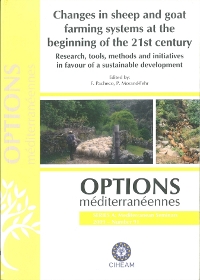| Article précédent | p. 175-191 | Article suivant |
Success factors in the quality chain of animal products from Trás-Os-Montes
The promotion of EU protection regulations and the implementation of mechanisms to support and trade products with protected names are processes which require a permanent negotiation among the actors' (economic and institutional) chain. The success factors of such collective initiatives, involving a variety of actors with different interests, depend on how organizations function and on their ability to coordinate efforts and cooperate with each other. Using the McKinsey model, the paper analyses the performance of Protected Designation of Origin - Protected Geographical Indication (PDO/PGI) animal products of Trás-os-Montes (Portugal), in the context of a reference market. This model evaluates performance using a cross analysis of two complex variables, market attractiveness and competitive position. As a result of the market attractiveness and competitive position evaluation (strong, medium or weak), the products studied are placed in the nine boxes of the McKinsey Matrix. The conclusions regarding the performance of the different products are discussed and explained according to a set of relevant variables. We may say that, in Trás-os-Montes, there is still room for improving the development of animal PDO/PGI products production chain but it does not by itself pose any structural problem since their development depends mostly on their own competitive position rather than on the competitiveness of their reference market.
Le développement des protections communautaires et l'implantation des mécanismes de promotion et de commercialisation des produits d'appellation protégée relèvent de processus exigeant des négociations permanentes entre les acteurs (économiques et institutionnels) de la filière. Le succès de ces initiatives à caractère collectif, implique un groupe d'acteurs ayant des intérêts parfois antagoniques, et dépend de la philosophie de fonctionnement des organisations et de leurs capacités de coordination et de coopération. En utilisant le modèle McKinsey, l'article analyse le fonctionnement des produits d'Appellation d'Origine Protégée (DOP) et d'Indication Géographique Protégée (IGP) d'origine animale à Trás-Os-Montes (Portugal) dans leur contexte de marché de référence. Ce modèle évalue le fonctionnement des produits par une analyse croisée des variables composées de l'attractivité du marché et de la position compétitive des produits. En utilisant les résultats de ces deux variables, les produits étudiés sont distribués par les neuf quadrants qui constituent la formule McKinsey. Le développement des filières des produits DOP/IGP d'origine animal de Trás-os-Montes montre une grande marge de progrès, sans de grandes difficultés de nature structurelle, en tenant compte que dans la plupart des cas, leur développement est plus dépendant de leur position compétitive que de l'attractivité du marché de référence.
- [ Afficher ]
- [ Télécharger ]
- [ Exporter la citation ]
Vous pouvez télécharger la citation au format :
- [ Imprimer ]
-
Mots-clés
APPELLATION D'ORIGINE, CONCURRENCE ECONOMIQUE, LABEL DE QUALITE, PORTUGAL, PRODUIT ANIMALCiter cet article
Tibério L., Cristovao A. Success factors in the quality chain of animal products from Trás-Os-Montes. In : Pacheco F. (ed.), Morand-Fehr P. (ed.). Changes in sheep and goat farming systems at the beginning of the 21st century : research, tools, methods and initiatives in favour of a sustainable development . Zaragoza : CIHEAM / DRAP-Norte / FAO, 2009. p. 175-191. (Options Méditerranéennes : Série A. Séminaires Méditerranéens; n. 91). Proceedings of the Seminar of the Subnetwork on Production Systems of the FAO-CIHEAM Network for Research and Development in Sheep and Goats, 2007/11/15-17, Ponte de Lima (Portugal). http://om.ciheam.org/om/pdf/a91/00801144.pdf



